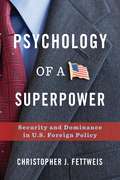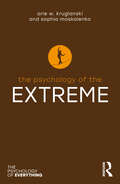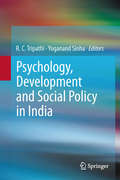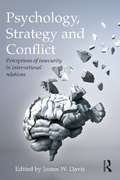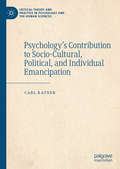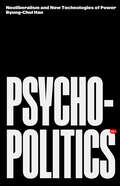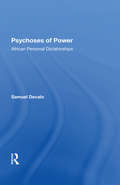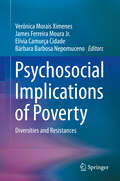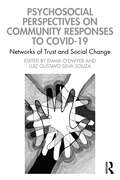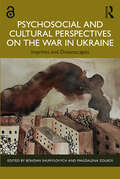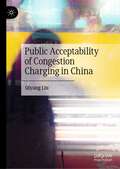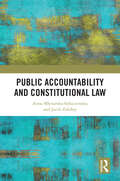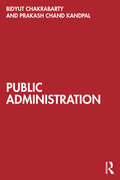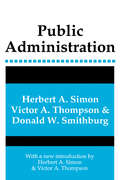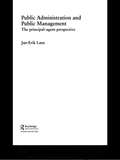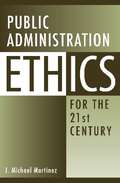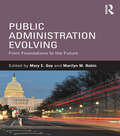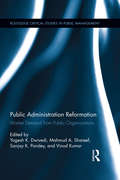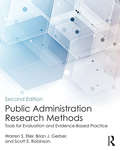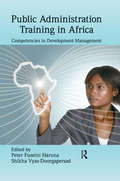- Table View
- List View
Psychology of a Superpower: Security and Dominance in U.S. Foreign Policy
by Christopher FettweisWith the collapse of the Soviet Union, the United States was left as the world’s sole superpower, which was the dawn of an international order known as unipolarity. The ramifications of imbalanced power extend around the globe—including the country at the center. What has the sudden realization that it stands alone atop the international hierarchy done to the United States? In Psychology of a Superpower, Christopher J. Fettweis examines how unipolarity affects the way U.S. leaders conceive of their role, make strategy, and perceive America’s place in the world.Combining security, strategy, and psychology, Fettweis investigates how the idea of being number one affects the decision making of America’s foreign-policy elite. He examines the role the United States plays in providing global common goods, such as peace and security; the effect of the Cold War’s end on nuclear-weapon strategy and policy; the psychological consequences of unbalanced power; and the grand strategies that have emerged in unipolarity. Drawing on psychology’s insights into the psychological and behavioral consequences of unchecked power, Fettweis brings new insight to political science’s policy-analysis toolkit. He also considers the prospect of the end of unipolarity, offering a challenge to widely held perceptions of American indispensability and asking whether the unipolar moment is worth trying to save. Psychology of a Superpower is a provocative rethinking of the risks and opportunities of the global position of the United States, with significant consequences for U.S. strategy, character, and identity.
Psychology of the Extreme (The Psychology of Everything)
by Arie W. Kruglanski Sophia MoskalenkoWhat does extremism mean? How does it show up in our daily lives? What drives people to extreme behaviors, and how can we learn to live and thrive in the age of overdrive?The Psychology of the Extreme provides an accessible introduction to extremism as a force that can affect all aspects of culture and people’s choices in everyday settings. It explores the underlying psychology behind what makes people act in extreme ways, whether this is in destructive ways (such as gambling, terrorism and political violence) or in constructive ways (such as successful creators and scientists). The book features an array of case studies that show how extremism can be both pro-social and anti-social and includes interventions to reduce extremism or redirect them toward more positive and constructive tendencies. Offering a new understanding of the individual psychology of extremism, the book will appeal to all those interested in how extremism plays out in people’s and cultures' day-to-day lives.
Psychology, Development and Social Policy in India
by R. C. Tripathi Yoganand SinhaThis book examines how and where psychology can engage itself in the framing of social policies for national as well as human development in India. Although the role that psychological knowledge can play in informing social policy decisions has been discussed for a long time, psychologists by and large have had little role in framing policy decisions related to such important domains as education, health, social justice and social inclusion. Policy makers, not only in India, but more or less everywhere have focused on interventions at the macro level, which has led them to ignore the root causes of the problems lying at the micro level. However, with the more humanistic approaches now being followed by economists and other social scientists, the person in society is slowly taking centrestage. Micro-level variables like happiness, the wellbeing of individuals and the social relationships within which people define themselves are becoming important. Therefore, this book discusses important psychological issues related to human development; particularly, health and education, social justice, social integration, environment and work organizations, besides focusing on some general issues relating to the logic of making social policies. It is a first-ever attempt in India to inform policy makers about how micro-variables can be a crucial factor to consider while framing social policies.
Psychology, Strategy and Conflict: Perceptions of Insecurity in International Relations (Routledge Global Security Studies)
by James W. DavisThis volume examines the explanatory nesting approach in the analysis of international relations and its continuing relevance in the 21st century. International relations theory urgently needs strategies for coping with the growing complexity of the international system following the collapse of the US–Soviet bipolar stalemate, the multiple challenges to US unipolar hegemony, and the rise of powerful non-Western actors. Over the course of this book, leading scholars of international relations and diplomatic history return to an approach to explanation pioneered in the writings of Robert Jervis. The approach calls for nesting multiple layers of explanation--systemic, strategic, and perceptual--in an integrated causal account that is simultaneously parsimonious and nuanced. Highlighting the logic of strategic interactions under uncertainty, it also integrates the effects of psychological biases and the unintended consequences of acting in complex systems to provide explanations that are at once theoretically rigorous and rich in empirical detail. Analyzing the current state of Realist theory, signaling under conditions of uncertainty and anarchy, the role of nuclear weapons in international politics, the role of cognition and emotions in economic and foreign policy decision making, and questions of responsibility in international affairs, the authors provide a compelling guide for the future of international relations theory. This book will be of much interest to students of international relations, foreign policy, and security studies.
Psychology’s Contribution to Socio-Cultural, Political, and Individual Emancipation (Critical Theory and Practice in Psychology and the Human Sciences)
by Carl RatnerThis book articulates how psychologists can use their theory, research, and intervention to generate insights into emancipatory social change that is necessary to solve social and psychological problems. These include racism, sexism, civil rights, poverty, militarism, education, and politics. Psychology was not developed to directly address social issues. It must therefore be reconceptualised to fulfil this aim. In this book Carl Ratner makes use of Vygotsky’s psychological approach known as ‘cultural-historical psychology’, supplemented by Martin-Baro’s Liberation Psychology and the work of Bourdieu and Foucault to develop an emancipatory psychological theory. This approach is then utilized to lay out a specific program of social and psychological emancipation. This reconstructed psychological theory is also used to evaluate populist movements that aim at social and psychological emancipation. Ratner posits that populism is inadequate to solve social and psychological problems because it misunderstands the nature of society and what it takes to improve society and psychology. This is demonstrated through wide-ranging examples including populist feminism, populist socialism, and populist distortions of liberation psychology and cultural-historical psychology.This lively critique opens a pathway for academic across the social sciences concerned with how their disciplines can be oriented toward understanding and solving social-psychological problems, and will appeal to wide readership including policy makers, and social activists.
Psychopolitics: Neoliberalism and New Technologies of Power (Futures)
by Byung-Chul HanExploring how neoliberalism has discovered the productive force of the psycheByung-Chul Han, a star of German philosophy, continues his passionate critique of neoliberalism, trenchantly describing a regime of technological domination that, in contrast to Foucault&’s biopower, has discovered the productive force of the psyche. In the course of discussing all the facets of neoliberal psychopolitics fueling our contemporary crisis of freedom, Han elaborates an analytical framework that provides an original theory of Big Data and a lucid phenomenology of emotion. But this provocative essay proposes counter models too, presenting a wealth of ideas and surprising alternatives at every turn.
Psychoses Of Power: African Personal Dictatorships (African Studies Ser. #Vol. 3)
by Samuel DecaloThis book is about the idiosyncratic personal dictatorships sprang up in Africa in the 1960s and 1970s. It surveys the social, economic, and political histories of Uganda, Central African Republic and Equatorial Guinea, exploring conditions that facilitated the rise of the dictatorial triumvirate.
Psychosocial Implications of Poverty: Diversities and Resistances
by Verônica Morais Ximenes James Ferreira Moura Jr. Elívia Camurça Cidade Bárbara Barbosa NepomucenoThis book presents a multidimensional, psychosocial and critical understanding of poverty by bringing together studies carried out with groups in different contexts and situations of deprivation in Brazil, Mexico, Paraguay, Nicaragua and Spain. The book is divided in two parts. The first part presents studies that unveil the psychosocial implications of poverty by revealing the processes of domination based on the stigmatization and criminalization of poor people, which contribute to maintain realities of social inequality. The second part presents studies focused on strategies to fight poverty and forms of resistance developed by individuals who are in situations of marginalization.The studies presented in this contributed volume depart from the theoretical framework developed by Critical Social Psychology, Community Psychology and Liberation Psychology, in an effort to understand poverty beyond its monetary dimension, bringing social, cultural, structural and subjective factors into the analysis. Psychological science in general has not produced specific knowledge about poverty as a result of the relations of domination produced by social inequalities fostered by the capitalist system. This book seeks to fill this gap by presenting a psychosocial perspective with psychological and sociological bases aligned in a dialectical way in order to understand and confront poverty. Psychosocial Implications of Poverty – Diversities and Resistances will be of interest to social psychologists, sociologists and economists interested in multidimensional studies of poverty, as well as to policy makers and activists directly working with the development of policies and strategies to fight poverty.
Psychosocial Perspectives on Community Responses to Covid-19: Networks of Trust and Social Change
by Emma O’Dwyer Souza, Luiz Gustavo SilvaThis highly topical edited book documents the community response to Covid-19 across national contexts, exploring the widespread development and mobilisation of community initiatives and groups. It provides rich analysis of case studies from the Global North and South, including South Africa, the USA, India, China, Mexico, Brazil, Italy, Australia, the UK, Turkey, and Argentina. The Covid-19 pandemic motivated a significant community response globally, with the widespread development and mobilisation of "bottom up" community initiatives and groups. These community responses were an essential yet often unseen and unrecognised means by which people survived the pandemic. This book asks questions such as how were community responses to Covid-19 shaped by national, cultural and political processes and phenomena; how did community responses to Covid-19 interact with public policies, on health, education, and social welfare; and what are the likely political implications of the community response to Covid-19? Discussing the provision of abortion care in Latin America, the support to marginalized communities in Kolkata, and the mobilisation of carnival "krewes" in New Orleans, to give a few examples, the text adopts and develops a novel socio-cultural psychological approach, weaving together contributions from scholars working in diverse disciplinary fields. The text highlights the importance of integrating multiple levels of analysis, including psychological, sociological, and political/ideological, to investigate how communities respond to crises such as the Covid-19 pandemic, and how they can plan for and manage future crises. This is essential reading for academics and students in psychology and the social sciences, as well as policy-makers, charities, and third-sector organisations.
Psychosocial Treatment of Schizophrenia
by Allen Rubin David W. Springer Kathi TrawverPraise for the Clinician's Guide to Evidence-Based Practice Series"A major stumbling block to the adoption of evidence-based practice in the real world of clinical practice has been the absence of clinician-friendly guides suitable for learning specific empirically supported treatments. Such guides need to be understandable, free of technical research jargon, infused with clinical expertise, and rich with real-life examples. Rubin and Springer have hit a home run with the Clinician's Guide to Evidence-Based Practice Series, which has all of these characteristics and more."-Edward J. Mullen, Willma and Albert Musher Chair Professor, Columbia UniversityState-of-the-art, empirical support for psychosocial treatment of schizophrenia Part of the Clinician's Guide to Evidence-Based Practice Series, Psychosocial Treatment of Schizophrenia provides busy mental health practitioners with detailed, step-by-step guidance for implementing clinical interventions that are supported by the latest scientific evidence. This thorough, yet practical, reference draws on a roster of experts and researchers in the field who have assembled state-of-the-art knowledge into this well-rounded guide. Each chapter serves as a practitioner-focused how-to reference and covers interventions that have the best empirical support for the psychosocial treatment of schizophrenia, including:Cognitive behavioral therapyAssertive community treatmentCritical time interventionMotivational interviewing for medication adherencePsychoeducational family groupsIllness management and recoveryEasy-to-use and accessible in tone, Psychosocial Treatment of Schizophrenia is an indispensable resource for practitioners who would like to implement evidence-based, compassionate, effective interventions in the care of people with schizophrenia.
Psychosocial Well-Being and Mental Health of Individuals in Marital and in Family Relationships in Pre- and Post-Genocide Rwanda
by Immaculée MukashemaThis book provides an in-depth examination of psychosocial marital well-being and mental health in traditional communities in Rwanda. It presents rich qualitative research conducted with men, women and elders, highlighting both the issues impacting on marital conflict and domestic violence, and also how potential solutions might be drawn from traditional practices. In doing, so it provides a unique resource for researchers and policymakers seeking to develop evidence-based and culturally-informed mental health and psychosocial support interventions in low and middle income countries. It will appeal in particular to those working the fields of public health, family psychology, social work, cross-cultural psychology and qualitative methodology.
Psychosocial and Cultural Perspectives on the War in Ukraine: Imprints and Dreamscapes
by Magdalena Zolkos Bohdan ShumylovychThis innovative and important book explores how war imprints on culture and the psychosocial effects of war on individuals and societies, based on the first few months after the outbreak of war in Ukraine in 2022.The book approaches the conflict in Ukraine through the prism of creative and artistic material alongside scholarly analysis to highlight the multiplicity of subjective experiences. Essays are complemented by material from the ‘war diaries’, which comprise day diaries, dream diaries, artistic and poetic material composed by students and academics in February and March 2022. With chapters focusing on fear, ruptures and resistance, the book examines different aspects of subjective, cultural and embodied experiences of war. It examines elements that dominant perspectives of war often overlook; the quotidian, personal and emotive ways that war is registered individually and collectively in societies and cultures.Highlighting different narratives that illuminate the complex effects of war, this book is highly relevant for postgraduate students, researchers and advanced undergraduate students in the fields of cultural psychology, psychosocial studies, peace and conflict studies and cultural history.Chapter 4, Chapter 5, Chapter 7 and Chapter 10 of this book are freely available as downloadable Open Access PDFs at http://www.taylorfrancis.com under a Creative Commons Attribution-Non Commercial-No Derivatives (CC-BY-NC-ND) 4.0 license.To read the online archive of Two Months of War, please visit the Urban Media Archive of the Center for Urban History (Lviv, Ukraine): https://uma.lvivcenter.org/en/collections/178/interviews
Psychospace
by Esther HervyFrance. 2023. One year on after the election of President Edouard, Emmanuel Macron’s successor. The French Employment Code is in the process of being ripped up, so people are clinging desperately to the jobs they hold. Julie has just been laid off from the Robarti Legal Bank, but miraculously she finds a new book-keeping post at Gargill & Co., the second biggest pesticide company after Tonsantar. She needs to eat and pay her bills, but does that mean she has to put up with absolutely everything from her new employer? Has everyone else surrendered to the belief that they’ve no choice other than to keep quiet and toe the line? Or are there still people prepared to fight back?
Psychotherapy and the Social Clinic in the United States: Soothing Fictions
by William M. EpsteinThis book offers a compelling critical analysis of American society by examining the role of psychotherapy within social policy and the culture that has fashioned it. It takes a deeply critical look at ‘the social clinic,’ defined here as a ubiquitous organizational arrangement that includes clinical and community psychology, counseling, clinical social work, psychiatry, much of the self-help industry, complementary and alternative medicine and others. Epstein’s analysis concludes that the social clinic lacks credible evidence of effectiveness and its continued popularity expresses popular but predatory American values such as romantic individualism, the triumph of the subjective, a sense of personal and political chosenness, persistent bigotry, and a preference for tribal as opposed to civic identities. This careful examination of American society through the lens of psychotherapeutic practice characterizes the social clinic as a soothing fiction of the United States.The book offers caring services as the unrealized alternative to clinical treatment, capable of achieving greater personal adjustment as well as social and economic equality. It will appeal to readers with an interest in social welfare, public policy, and public administration, as well as to students and scholars of psychotherapy, counseling, social work, rehabilitation, and community psychology.
Public Acceptability of Congestion Charging in China
by Qiyang LiuThis book explores the public acceptability of congestion pricing in the Chinese context. Successful in western cities, notably London, congestion pricing has overcome vested interests to revitalize city centers and reduce pollution. Given the radically different nature of China's culture and political system, the author articulates why public acceptability should be an issue and how it will look in an authoritarian context. Based on stakeholder interviews, focus groups and an attitudinal survey, this book will interest policymakers, planners, and scholars of transport governance.
Public Accountability and Constitutional Law
by Anna Młynarska-Sobaczewska Jacek ZaleśnyThis book analyses the public accountability of political actors in contemporary democratic states. Accountability as understood here is a necessary condition of democracy: delegation of power with transparency and supervision over those who are chosen to exercise the power of the state. The authors identify paths of executing accountability in the electoral process, as well as in traditional instruments of parliamentary scrutiny and other relationships between the legislative, executive and judicial branches. They track how well-known mechanisms of democracy fulfil the need to report on the exercising of an entrusted power. They also explore how new developments in the constitutional framework, that is, the post-evaluation of legislation, and beyond it in mass social movements, Big Tech companies and social media, are changing the classic and established concepts of accountable power. The book will be a valuable resource for academics, researchers and policymakers working it the areas of Constitutional Law and Politics and Accountability Studies.
Public Actors in International Investment Law (European Yearbook of International Economic Law)
by Catharine TitiThis open access book focuses on public actors with a role in the settlement of investment disputes. Traditional studies on actors in international investment law have tended to concentrate on arbitrators, claimant investors and respondent states. Yet this focus on the “principal” players in investment dispute settlement has allowed a number of other seminal actors to be neglected. This book seeks to redress this imbalance by turning the spotlight on the latter. From the investor’s home state to domestic courts, from sub-national governments to international organisations, and from political risk insurance agencies to legal defence teams in national ministries, the book critically reviews these overlooked public actors in international investment law.
Public Administration
by Bidyut Chakrabarty Prakash Chand KandpalThis textbook is a comprehensive, student-friendly guide to understanding the fundamentals of public administration. It examines the recent developments and relevant theoretical underpinnings in an accessible manner.Public Administration: Helps students grasp key dialectical interconnections between theoretical conceptualizations and prevalent socio-economic and political circumstances Provides understanding of issues in governance Analyses significant transformations in civil society and administrative set-ups across the world Highlights the contributions of non-Western thinkers in the development of conceptual ideas of the discipline Accessibly written, it caters to a wide range of university syllabi in public administration and will be essential for students and researchers of political science, public policy and public administration. It will also be particularly useful for those preparing for the civil service examinations.
Public Administration
by Herbert A. Simon Donald W. Smithburg Victor A. ThompsonAt the time of its initial publication, Public Administration helped to define this field of study and practice by introducing two major new emphases: an orientation toward human behavior and human relations in organizations, and an emphasis on the interaction between administration, politics, and policy. Without neglecting more traditional concerns with organization structure, Simon, Thompson, and Smithburg viewed administration in its behavioral and political contexts. The viewpoints they express still are at the center of public administration's concerns.
Public Administration & Public Management: The Principal-Agent Perspective
by Jan-Erik LaneA perspective on the public sector that presents a concise and comprehensive analysis of exactly what it is and how it operates. Governments in any society deliver a large number of services and goods to their populations. To get the job done, they need public management in order to steer resources – employees, money and laws – into policy outputs and outcomes. In well-ordered societies the teams who work for the state work under a rule-of-law framework, known as public administration. This book covers the key issues of: the principal-agent framework and the public sector public principals and their agents the economic reasons of government public organization, incentives and rationality in government the essence of public administration: legality and the rule of law public policy criteria: the Cambridge and Chicago positions public teams and private teams public firms public insurance public management policy Public Administration & Public Management is essential reading for those with professional and research interests in public administration and public management.
Public Administration Ethics for the 21st Century
by J. Michael MartinezThis volume establishes a foundation for a uniform code of professional ethics for public administrators in the United States. * Four cases of ethical and unethical decision making in context--Nathan Bedford Forrest, William Calley, Adolf Eichmann, and Mary Anne Wright--who resigned in protest over the 2003 invasion of Iraq * Six figures depicting the process of ethical decision making within a public organization * An extensive bibliography listing of the major sources on administrative ethics in print and online * An index of key thinkers and theories involving administrative ethics
Public Administration Evolving: From Foundations to the Future
by Mary E. Guy and Marilyn M. RubinPublic Administration Evolving: From Foundations to the Future demonstrates how the theory and practice of public administration has evolved since the early decades of the twentieth century. Each chapter approaches the field from a unique perspective and describes the seminal events that have been influential in shaping its evolution. This book presents major trends in theory and practice in the field, provides an overview of its intellectual development, and demonstrates how it has professionalized. The range from modernism to metamodernism is reflected from the perspective of accomplished scholars in the field, each of whom captures the history, environment, and development of a particular dimension of public administration. Taken together, the chapters leave us with an understanding of where we are today and a grounding for forecasting the future.
Public Administration Reformation: Market Demand from Public Organizations (Routledge Critical Studies in Public Management #18)
by Yogesh K. Dwivedi Vinod Kumar Mahmud A. Shareef Sanjay K. PandeyIn an attempt to instil trust in their performance, credibility, integrity, efficiency, cost-effectiveness, and good governance, many public organizations are in effect viewing tax-paying citizens as consumers. Little research exists to explore synergies between the market economy, public administration reformation, and their complex bilateral effects. This book takes a timely look at the heightened need for public administration reform as a result of the economic challenges currently faced by nations across the globe. In particular it explores the roles of eGovernment and a citizen-centric focus in this transformation. Public Administration Reform examines several commonly-held assumptions about public administration: the public sector is slow and bureaucratic; government employees are frequently disengaged; and government agencies are sometimes wasteful. eGovernment is proposed as a key tool in the improvement of both public services and reputations of public organizations.
Public Administration Research Methods: Tools for Evaluation and Evidence-Based Practice
by Scott E. Robinson Warren S. Eller Brian J. GerberThe best decisions made by public managers are based not on instinct, but on an informed understanding of what’s happening on the ground. Policy may be directed by ideology, but it must also be founded on reality. The challenge of making the right decisions as a public manager is often, therefore, based on the need for rigorous, actionable research. Now in a thoughtfully revised second edition, this textbook shows students of Public Administration exactly how to use both qualitative and quantitative research techniques to give them the best chance to make the right decisions. Uniquely, Eller, Gerber, and Robinson present research methodologies through a series of real-life case studies, with each chapter exploring situations where a public manager can use research to answer specific questions, demonstrating how that research can inform future policy. Taking readers through the key concepts, from research design and sampling to interviews, survey data, and more statistical-based approaches, this new edition provides a complete guide to using research in the public and voluntary sectors. New to this edition: To better orient the student, the second edition is thematically arranged. Five sections, each with a short essay, provide not only previews of the content of each section, but more importantly guide the reader through how the concepts and techniques covered relate to real-world use and application. A new chapter on applied quantitative analyses has been added to offer coverage of several commonly-used and valuable analytic techniques for decision making for policy and management: benefit-cost analysis, risk assessment, and forecasting. The second edition is accompanied by online materials containing suggested course plans and sample syllabi, PowerPoint lecture slides, and student support materials to illustrate the application of key concepts and analytic techniques. Each chapter also includes discussion questions, class exercises, end of chapter review questions, and key vocabulary to provide students with a range of further tools to apply research principles to practical situations.
Public Administration Training in Africa: Competencies in Development Management
by Peter Fuseini Haruna Shikha Vyas-DoorgapersadThere is a growing global interest in Africa and how to improve the quality of life of its people and for good reason. The world can no longer afford to ignore the democratic changes that have occurred across the continent over the past two decades, changes with tremendous implications for professional education and training for the tasks of nation
